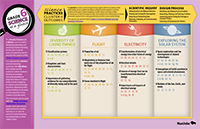_DOWN.png)
_DOWN.png)
_DOWN.png)
_DOWN.png)
_DOWN.png)
_DOWN.png)
_DOWN.png)
_DOWN.png)
_DOWN.png)
_DOWN.png)
_DOWN.png)
_DOWN.png)
_DOWN.png)

In Grade 6, children investigate different types of animals to learn how they fit into a classification system for living things. A study of the properties of fluids helps children to understand how flight is possible. Children compare two types of electricity: current and static electricity and show how electricity can be transformed into motion and motion into electricity. Grade 6 children learn about the Earth in space, the objects in the solar system and their motions. They investigate related ideas such as the cycle of day and night, the cycle of the seasons and the phases of the moon. There is a focus on how space research programs increase scientific knowledge and the contributions Canadians have made to space exploration.
To find out more about what your child is learning, we encourage you to talk to the teacher. You may also find helpful information on the Curriculum Essentials posters, which are interactive PDFs designed for teachers that provide an overview of the knowledge, processes, and skills for this subject area.

Grade 6 Science Curriculum Essentials posters ( 542 KB)
542 KB)
The first page gives an overview of what your child will be learning, grouped into big ideas so that the curriculum is easier to understand. The number codes correspond to the curriculum learning outcomes. The arrow at the top of the page highlights the skills and attitudes, which are described in more detail on the third page. These should be integrated throughout the teaching and learning of science. The second page offers a more detailed description about the expectations related to the big ideas and the categories found on the provincial report cards regarding assessment.
You may also wish to refer to the Grades 5-8 Science - Manitoba Curriculum Framework of Outcomes.
The teacher will assess your child’s progress in the areas described in the WHAT MY CHILD IS LEARNING tab. The teacher will also assess how your child applies scientific inquiry skills, solves problems and makes decisions in science.
Your child’s progress will be reported under three areas of learning:
The teacher will report on your child’s progress three times a year. The information from each report helps you to support your child’s learning. You can use it to talk with your child and your child’s teacher about results, strengths, challenges and what your child will be doing next.
Children are naturally curious and are eager to explore and discover the world that surrounds them. Cultivate this curiosity. Consider games and toys that nurture the design process and problem solving.
Here’s a few website you can start with to get some ideas.
Try Science – science activities for children and their families that can be done at home.
Let’s talk science offers a comprehensive database of science activities for the families.
